Transmission Repair Specialists in West Jordan, Utah
Is your vehicle experiencing transmission troubles? We're transmission repair geniuses! We guarantee we can fix your transmission and get you up and running in no time.
READ MORE -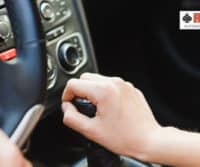
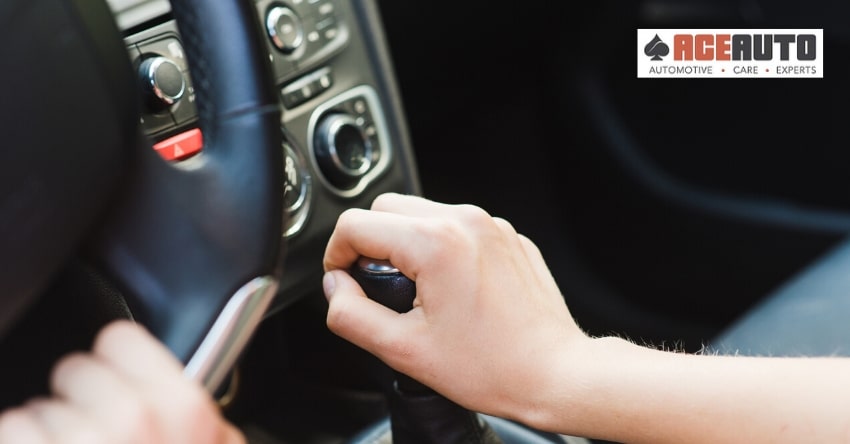
If you’ve ever had grinding gears automatic transmission problem or you’ve experienced manual transmission grinding in 3rd gear, you’re not alone. This is a very common gear issue, but it's important to be educated on the problem to keep your car or truck in the best condition possible. Keep reading to learn more about the grinding gears meaning, including how to fix grinding gears, and who you should contact for top-notch automotive care.
In simple terms, gears grinding stems from the speed of your wheels and engine not being on the same page. This mismatch in speed can cause a very troubling grinding noise. In order for the next gear to change in your gearbox, the shafts for both input and output should move at the same speed. In modern vehicles, synchro rings help these parts to move at the right speeds, which is why this issue is less common. But in older vehicles or in gearboxes used in American semi-trucks, these rings aren’t utilized. In order to limit grinding gears, semi-truck drivers match the speed by pressing down on the throttle to increase engine revs on downshifts, then waiting for the RPMs to drop when shifting up. This is a very difficult skill to master, but semi-truck drivers do this very well.
Although manual transmission vehicles can be very beneficial, they are less common today than they used to be years ago. Manual transmissions were a hot commodity due to the fact that they typically cost less and allow for a few more miles per gallon. But as the technology and simplicity around automatic vehicles have been on the rise, manual transmissions are far less common.
Due to the design of manual transmissions, the system is more distinct for selecting gear ratios and matching those with the engine and wheels. When you shift into a different gear, the gears are being coupled with the input and output shafts of your transmission, which creates a proper gear ratio adjustment. As the gear shift is made, a collar slides over the end of the gear. When you hear a grinding sound, this happens because that collar that is colliding with the end of the gear is spinning at a slower or faster rate compared to the shaft in your transmission. To limit this grinding sound, a synchronizer ring is used to match these speeds effectively. But if you constantly hear a grinding noise, this could mean that the part isn’t working correctly or that you don’t have enough transmission fluid.
Automatic transmissions work similarly to manual ones, but the key difference is that the car shifts gears automatically based on preset RPM settings. However, while grinding sounds are more common in manual cars, automatic transmission grinding when shifting can still happen. To limit the automatic transmission problems shifting gears, it’s best to consider the following:
Whether you’re dealing with an automatic transmission not shifting into high gear or any other automotive problem, Ace Auto Repair is here to help! We can diagnose the transmission problem and have it working perfectly in no time! Call us today to work with our fast, friendly, and reliable team!
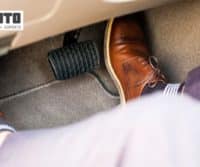
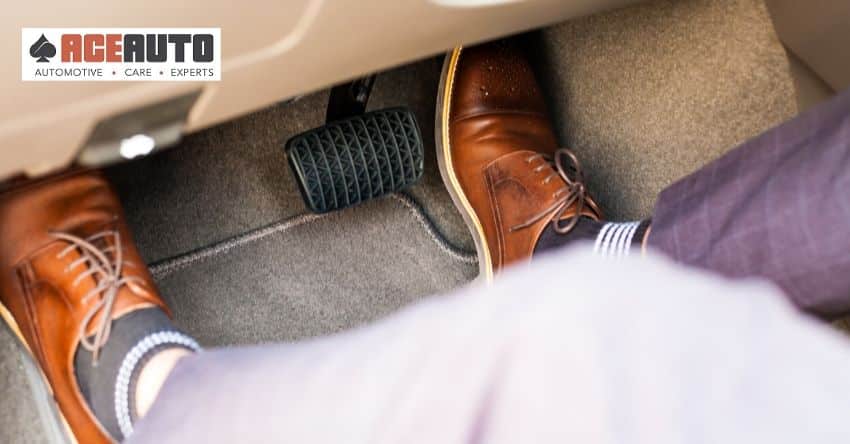
Without our vehicles, it would be nearly impossible to go to work, take the kids to school, go to the grocery store, and complete many other important tasks. But even if you own a vehicle, it's vital to make sure it stays in good health. The unfortunate truth is, many things can happen to our precious rides—and knowing how to fix issues might be extremely difficult. One of the leading problems we’ll discuss today involves the clutch of a vehicle. This is a vital component to your car or truck, and knowing when it’s failing and needs to be replaced can go a very long way. In this post, we’ll talk about 5 clutch symptoms that you should pay attention to right away.
One of the leading signs of clutch failure is when it feels soft. When you depress the pedal of the clutch, there should be some resistance felt. Given how the clutch itself is a heavy spinning disc constructed of metal and springs, this shouldn’t be very easy to move. If you press down on the pedal and it is very easy and soft like butter, then that means your clutch could be nearing the end of its days.
When you try to put your car in reverse, the engine power in the crankshaft is sent in the opposite direction of what it’s used to. That leads to the common “clunk” sound and you might also feel a clutch vibration when shifting. This causes a lot of force from the clutch, which might lead to the component breaking down over time. If your car struggles to find the reverse gear, then you’re experiencing one of the more common signs of clutch problems and solutions are very possible.
If you hear strange noises when you’re engaging or disengaging your clutch pedal, then this might mean that your clutch is beginning to wear out. More specifically, this is typically due to a worn-out clutch fork. This is a hydraulic or mechanical releasing device that helps the clutch function properly. However, you could be dealing with a clutch fluid evaporate problem if there is no more fluid in the clutch fork. Take your car to an auto shop to help with this issue.
Another common clutch problem is when the clutch pedal sticks to the floor. This means that you have binding issues with the linkage or release bearing. To help this problem, make sure the springs in the linkage aren’t over-stretched. If they are, they may need an adjustment. Another tip is to check the release bearing and make sure the pedal stop is in the correct place.
A lot of vehicle owners complain that they have issues with their clutch after cold weather. This is because cold weather can cause your system to contract, and extreme contraction can cause your clutch master cylinders to fail. Another issue is freezing fluid. Now you may be wondering, “can clutch fluid freeze?” And that answer is yes, but it's very rare and only happens in very extreme weather or when water gets into the clutch line.
Whether you’re dealing with a clutch overheat problem or anything else with your ride, Ace Auto Repair is here to help. Stop searching for “clutch repair shop near me” and pick up the phone and call the most reliable team in the area!
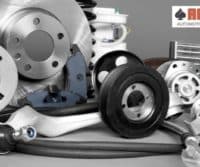
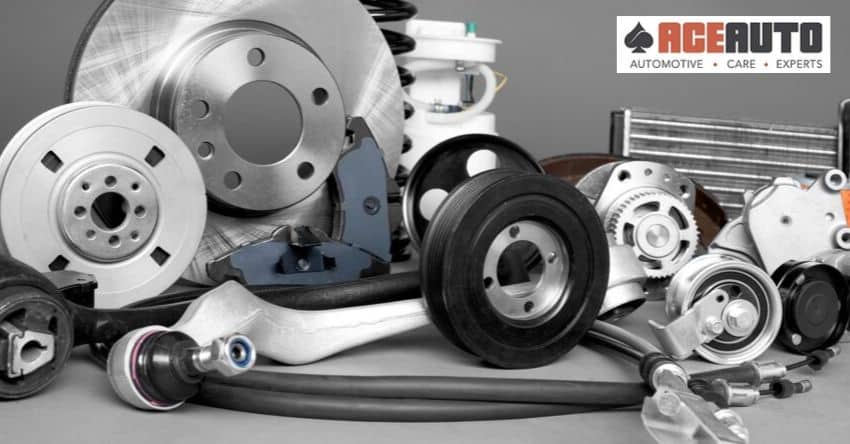
Many people depend on their vehicle to get them from place to place such as running errands around town, going to school, and going to work. Like any other machine, a car can have problems from time to time and people might realize that they need to make repairs on their car. When they are told their car needs to be repaired, they might not be prepared for the cost. Maybe they assumed that insurance would cover all of the costs or perhaps that did not think that anything serious was wrong. The cost of these repairs can be difficult for a family to bear. They might be thinking about saving money by putting on aftermarket car parts. It is important for everyone to understand what are aftermarket car parts. People might also be asking are aftermarket car parts as good as OEM? Why not compare and contrast the two options?
OEM stands for original equipment manufacturer and people might be wondering where to buy OEM car parts. Typically, a dealership is going to work with OEM parts. These are parts that have been made both by and for the vehicle itself. They are meant to work like the original parts in the vehicle and might let the vehicle function better. Some of the other benefits of working with OEM car parts is that they are easy and simple to choose. Quality is guaranteed since they are made for the vehicle. Finally, most of these parts also come with a warranty on the parts.
On the other hand, OEM parts are also typically more expensive than their aftermarket counterparts. They are typically also more expensive since they have been made directly by the manufacturer and often are brand new.
Some people might elect to take their car to an independent dealer. Here, the dealer will be working with aftermarket parts. These parts are similar; however, they have not been made specifically for the vehicle itself. Therefore, it is important for everyone to know a little bit about aftermarket car parts. Some of the benefits of aftermarket parts is that they typically have a lower cost, thus the name aftermarket. Depending on the purpose of the parts and the vehicle, these parts actually might work a little bit better because of the variety. With more variety, there is more functionality, contributing to a wide range of quality.
Of course, this range also means there is a bit of an unknown factor. They might not work well at all. People can also be overwhelmed by the options and might not know where to start. Finally, these parts rarely come with a warranty. People take on a lot of risk by going with aftermarket car parts.
When it comes to vehicle repair, trust the professionals to do it right the first time. If your vehicle needs repairs, call Ace Auto Repair or visit our website to learn more! We are proud to provide services on cars, trucks, SUVs, and more in West Jordan and the greater Salt Lake City, UT area. We will keep you informed during the repair process and will be as honest and transparent as possible. Call us today!


Many times when someone asks how to save fuel, the first answers they get are suggestions on how to get around without a motor vehicle of their own, such as biking, walking, or using public transportation. While sometimes these suggestions are helpful, other times making these changes are too drastic of a blow on a person's lifestyle. What they really need to know is how to save gas while driving. Fortunately, there are ways that this can be achieved.
If you go to work with a headache or a cold, chances are you'll start feeling drained before the day is done. The same goes for your car. Any vehicle is going to get its best gas mileage if it is working as well as it possibly can. Automakers may advertise excellent gas mileage, but if the vehicle isn't working properly, it will use more gas just to function.
Pay attention to things like the check engine light, and make sure that the tires are staying properly inflated. Don't seek to own a vehicle with a more powerful engine than you really need. In addition to reducing fuel economy, ignoring problems also increases emissions that at harmful to the environment. Not keeping up with basic maintenance may also lead to greater repair costs in the long run.
If you're a "crazy driver" don't be surprised to see crazy bills at the pump. Aggressive driving has been known to lower fuel efficiency by close to a third.
Driving the speed limit is actually a practice that can save fuel, as fuel economy starts to dwindle past 50 mph. Too much braking and sudden acceleration can be hard on efficiency as well, as it can burn as much as a half-gallon of fuel in a single hour.
One of the biggest waves to save fuel is to make sure that when you are driving, you are moving as much as possible. That means limiting the amount of time you leave your car idling. The Department of Energy suggests not having your vehicle in the park for more than 10 seconds, if possible.
The more fully you have to start and stop at traffic lights, the more fuel you will use, and the harder you will be on your car. Coasting to slow speed before braking will make things easier. When roads are good, cruise control can be a helpful fuel-saving tool, although it is not a good option for slippery roads.
Climbing into a nice cool car on a hot day might feel good, but if you are looking to save gas money, too much air conditioning isn't necessarily the best way to go. Cooling the car by opening windows is a more fuel-efficient alternative.
There are a lot of vehicles on the market that are designed for great fuel efficiency, but how your drive and take care of your vehicle are just as important as choosing the best vehicle you can. For most people, it's all they can do to do the best they can with what they've got.
At Ace Auto in West Jordan, Utah, our team can help make sure your vehicle is working at its best. To learn more, contact us at 801-803-6016, or visit us online at AceAutoUtah.com.
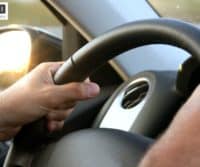
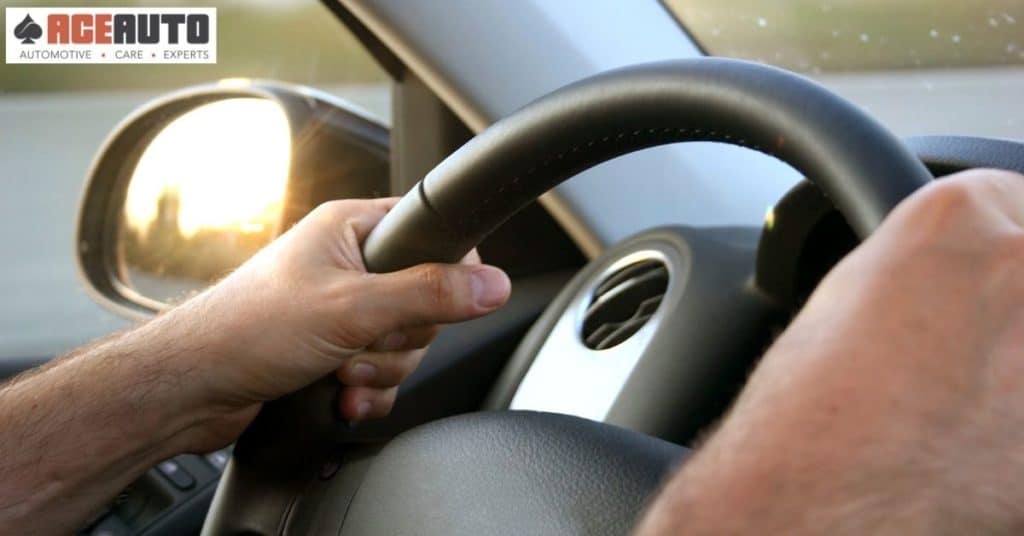
While steering problems can give you a headache, it is important to know the root of your problem. Your steering problems could be due to suspension system issues, bad tires, or other issues that have nothing to do with your steering system. But it could be the steering system, which is why it is so important to correctly diagnose the problem. It is important to fix steering issues as quickly as possible because driving with these problems can lead to an accident or an injury. If you live in Utah, visit Ace Auto in West Jordan and receive affordable service from experienced mechanics.
No matter what the cause or signs of steering problems, whether it is power steering problems or electric power steering problems, it is essential that you take your vehicle to a certified, experienced mechanic to fix the issue. Driving a car with power steering issues could lead to accident or injury. Give Utah’s trusted mechanics at Ace Auto a call today at 801-803-6016 to schedule an appointment and get a free repair quote!
Recent Comments